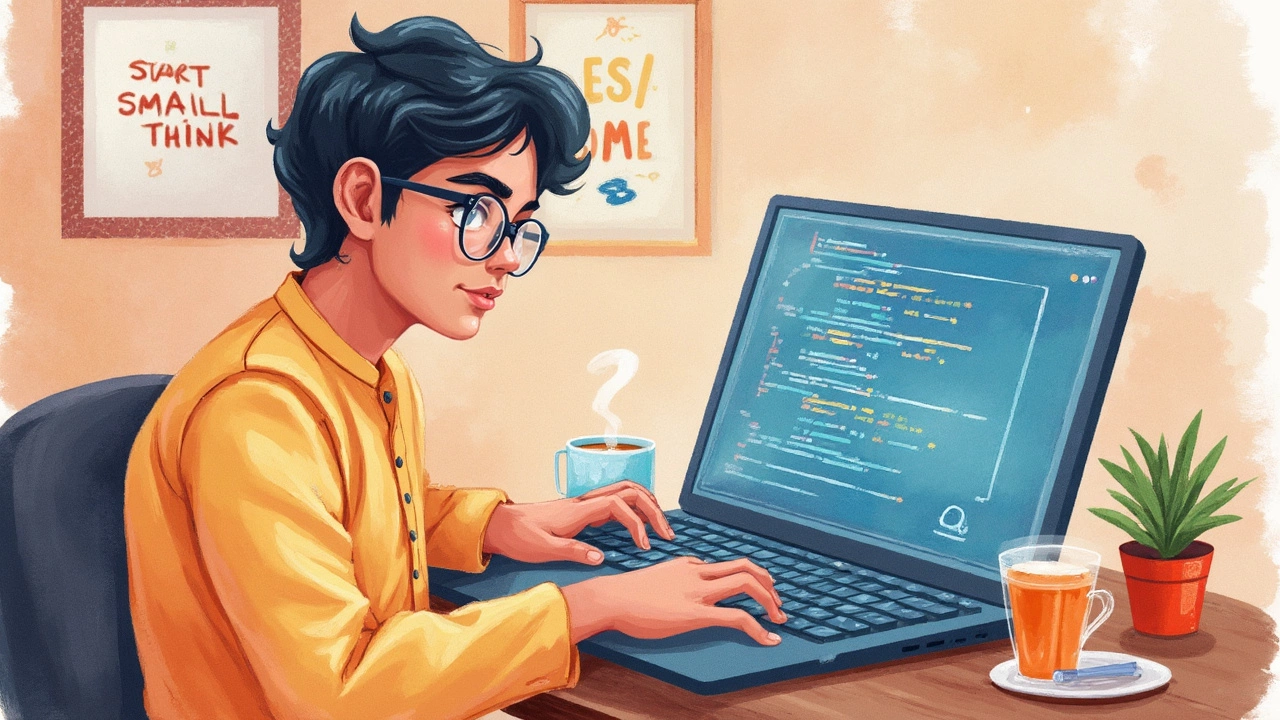People make learning to code sound harder than it needs to be. Truth? You don’t need to be a math wizard or have superpowers. All you need is curiosity and a laptop—or honestly, just a smartphone will do for a start. Everyone from high schoolers to retirees has picked it up, so you’re definitely not late to the party.
Here’s something people rarely say: you don’t have to memorize endless lines of code. There are cheat sheets, forums packed with friendly nerds, and endless tutorials just a Google search away. Coding is more about problem-solving than pure memory. Think of it like learning how to cook; you might burn a few pancakes, but you’ll get better with practice, not by reading cookbooks all day.
If you have a goal, like building a simple website or a game, that’s like secret fuel. Pick something fun, so you actually want to come back the next day. And no, you’re not expected to write the next Facebook—just get a taste for making stuff work. Trust me, that first moment when your code does what you wanted is a special kind of rush.
- Breaking Down the Coding Hype
- Choosing Your First Language
- Setting Up and Jumping In
- Tips to Keep Going Strong
Breaking Down the Coding Hype
Coding gets hyped up everywhere—from tech conferences to slick ads promising you a six-figure salary if you learn in just six months. But don’t let the noise fool you. Coding isn’t magic, and you don’t need to be a genius or a math pro to get started. Around 23 million people worldwide are doing it right now, and most started with almost zero experience.
Let’s get honest about what learning to code really means. At its core, coding is just giving instructions to a computer to make it do things—like adding up numbers, moving a character across a screen, or even sending memes to your friends. Most of it is in languages designed to be as easy to read as possible. For example, Python uses English-like words and has simple rules, making it a classic starter language.
Here’s a little-known fact: computers only understand two things—on and off, like flipping light switches (that’s called binary). Programming languages are there to help humans talk to computers without messing with a million ones and zeroes.
Don’t fall for the myth you have to sit in a dark room for years to become good. With online courses, YouTube tutorials, and even free phone apps, you can start learning wherever and whenever you want. Kids have built apps before hitting middle school just by following short, focused lessons.
So, strip away the hype and keep it simple. Get your hands dirty with easy tools. Try interactive websites like Codecademy or Khan Academy; both offer free beginner coding classes that really walk you through things step-by-step. And don’t worry about failing. In coding, mistakes are just part of figuring stuff out. If you Google “famous coding errors,” you’ll see even pros have messed up in major ways (remember, NASA’s Mars Climate Orbiter crashed in 1999 because of a unit conversion error in code!).
- Anyone can learn to code, no matter their background.
- You’ll see progress faster by trying small projects and playing around.
- Don’t waste time stressing about perfection—messing up is how you learn.
The point is, coding is more approachable than it seems. All the hype? It’s just noise. Start simple and you’ll surprise yourself by how quickly you pick things up.
Choosing Your First Language
Picking your first programming language feels like picking a direction at a crossroads. There are plenty of options, but the best one for you comes down to what you want to do and how you like to learn. You don't need to settle on one forever—you just need something friendly that helps you stick around when things get tricky.
Let’s break down the popular choices people actually start with:
- Python: If you want something beginner-friendly, this is where most teachers and online classes point you. It's used for websites, games, and even simple AI. Clean looking and forgiving, Python avoids weird curly brackets and semicolons that can trip you up. In Stack Overflow’s 2024 Developer Survey, 48% of new programmers started with Python.
- JavaScript: This is the go-to for anyone excited about websites. Want to make buttons click or forms light up? JavaScript lives inside every web browser and has instant feedback, which makes it rewarding when you're new. Plus, over 95% of websites use it somewhere.
- Scratch: For kids and people who want to get the hang of basic ideas without worrying about code “syntax.” You drag and drop blocks instead of writing code. It’s fun, visual, and you can actually build games.
- Java and C#: If you’re gunning for Android apps or games, these two come in handy. They’re a little wordier but pop up a lot in the job market. Java is huge in high schools, and C# rules on Xbox and Windows games.
Here's a quick table to compare your options:
| Language | Main Use | Difficulty | Typical First Project |
|---|---|---|---|
| Python | Web, AI, Automation | Easy | Calculator or Quiz Game |
| JavaScript | Websites | Easy/Medium | Interactive Web Page |
| Scratch | Games, Animation (Visual) | Very Easy | Simple Game or Story |
| Java | Apps, Android, Enterprise | Medium | Mobile App, Simple Tool |
| C# | Games (Unity), Windows | Medium | 2D Game, Windows App |
Don’t let their names stress you out. Remember, you can jump from one to another later. But for your very first step, choose the language that matches your project idea and has the most beginner help—like free tutorials and sample code. And yes, all of these have loads of free stuff online to get you rolling.
If you want fast wins and lots of friendly guides, Python is probably the top pick. But if websites get you excited, JavaScript’s your friend. Still not sure? Flip a coin! The real trick is just starting.

Setting Up and Jumping In
Getting set up to start coding doesn't mean buying fancy gear or spending hours messing with settings. Most coders today—over 70%, according to Stack Overflow’s 2024 survey—use laptops or regular desktops, nothing special required. So, the odds are good you’ve already got what you need.
If you’re brand new, online tools like Replit, Codecademy, or even freeCodeCamp mean you don’t have to download anything. Just open your browser, make a free account, and type away. But if you’re itching to get more hands-on (and want to save your projects), it’s time to set up your own playground on your computer.
- Coding Language Choice: Picking something like Python or JavaScript is popular for beginners because they’re easier to read, have loads of tutorials, and are useful in tons of real-world projects.
- Get a Code Editor: Download Visual Studio Code (VS Code) or Sublime Text—both are free and beginner-friendly. These help you write and test code smoothly.
- Install What You Need: For Python, go to python.org and grab the latest version. For JavaScript, your browser is already set up, but tools like Node.js add extra power.
- Test with Your First Project: Make a folder for your experiments. Try printing "Hello, world!"—if you see those words appear, you’re officially coding.
Bumping into issues? It’s normal. Googling errors is a genuine skill. In fact, a GitHub study found that new coders spend about 36% of early learning time just troubleshooting. Don’t sweat it—it’s how everyone learns.
| Tool | Why It’s Useful | Cost |
|---|---|---|
| VS Code | Clean interface, lots of extensions | Free |
| Python | Beginner friendly, tons of tutorials | Free |
| Replit | No downloads, run code in browser | Free (some paid features) |
The main thing? Don’t overthink it. Open up your editor or browser, write your first few lines, and start poking around. Every coder’s first projects are messy, but they always count as real progress.
Tips to Keep Going Strong
Staying consistent is everything when you’re just starting out. Beginners drop off most often after three weeks, which is right when learning to code starts feeling both familiar and tough. The trick? Make coding part of your routine, instead of something you 'squeeze in' when you have extra time.
- Set tiny, real goals. Big ambitions are great, but 'I’ll build an app this month' is vague and overwhelming. Try aiming to finish a coding lesson or get a button to work on your website before the week is out. Small wins add up and keep you motivated.
- Practice every other day instead of cramming. Thirty minutes three times a week beats hours-long, once-a-month marathons. Your brain learns better when you space things out.
- Ask for help early. Stack Overflow, Reddit, or Discord servers are packed with advice. Don’t sit stuck staring at a bug for hours. Most beginner coding questions get answered in under a day on forums.
- Celebrate what works. It sounds cheesy but take screenshots, show friends, or write about your progress. Some coders use Twitter or blogs as public journals, and it keeps them going.
Worried about forgetting stuff? Everybody does—even pros. Most programmers search Google daily for things they’ve seen a hundred times. It’s normal.
| Tip | Why It Helps Beginners |
|---|---|
| Use free resources | Websites like FreeCodeCamp report over 40 million users, and their hands-on exercises boost learning better than just watching videos. |
| Find a study buddy | Coding with a friend or joining a group can double your chances of finishing projects, according to several online bootcamp surveys. |
| Stick to one language at first | Jumping between languages confuses beginners. Getting confident in one builds a strong foundation and makes others easier later on. |
The most successful coding beginners treat it less like school homework and more like daily puzzle-solving. Try different things until you find what keeps you interested and learning.

